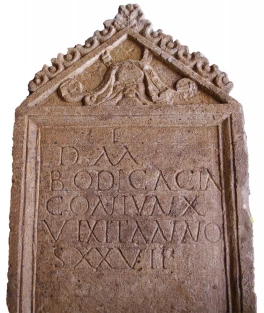
Earlier this week I came across the Sky production of Britannia. Originally aired in 2018, this series depicts the conquering of Britain by Rome in AD 43. Whilst the historical accuracy may be a wee bit on the sketchy side (and was clearly never the aim), it does contain the elements one would expect from such a dramatization. Brutal Roman soldiers? Check. Sympathetic Britons? Check. Crazy, drugged out Druids? Double check. Part way through the first episode, after the Romans have interrupted the coming of age ceremony held by the Cantiaci tribe on the solstice, killing or enslaving most of the settlement, a conversation takes place between one young escapee from the slaughter and her reluctant saviour, an outcast of the Druids whose prophetic abilities warning of the invasion were ignored.
Cait: What’s a Roman?
Outcast: The Romans are devils. They are the foot soldiers of Locher, the great earth demon. He started a place called Rome.
Cait: What’s Rome?
Outcast: Rome is one of the seven mouths of hell. Basically, it was just some god-forsaken shit hole in the middle of nowhere but Locher came up from the underworld and made it his home on earth. And he filled it with his power and it grew and grew and grew, and now Rome spreads all the way across the whole world. Even here.
In a week when the ongoing disaster that is Brexit and the current government here in the UK has been ramped up to a point that is beyond the ridiculous, the above exchange made me think that in the minds of many in this country, the EU could replace Rome and the sentiment would remain true. But this disregards the benefits that came with both the Romans and the EU, and whilst there is little point re-iterating the ‘What have the Romans ever done for us?’ speech of Monty Python fame here (although….), it does illustrate something about how the British conceive of their own mythology and origins.
Take for example, Boudicca, the Iceni woman who led a revolt against the Romans about fifteen years after the invasion. She is, to this day, held as a paragon of British spirit and pride. Her image, mounted on a chariot with her daughters, sits on the corner of Westminster Bridge, only meters from the Houses of Parliament. More than once in the three years since the Brexit referendum vote, I have heard or read her name as an example to aspire to, her fight against the Romans equated to the fight against the EU. And yet, historically, she was a blip. This is something that always surprises my (British) students. Tacitus, the first century AD historian and only near contemporary source for the British conquest, deigns to give Boudicca three whole paragraphs in his Annals. Three. He says:
XIV.31 The Icenian king Prasutagus, celebrated for his long prosperity, had named the emperor his heir, together with his two daughters; an act of deference which he thought would place his kingdom and household beyond the risk of injury. The result was contrary—so much so that his kingdom was pillaged by centurions, his household by slaves; as though they had been prizes of war. As a beginning, his wife Boudicca was subjected to the lash and his daughters violated: all the chief men of the Icenians were stripped of their family estates, and the relatives of the king were treated as slaves. Impelled by this outrage and the dread of worse to come—for they had now been reduced to the status of a province—they flew to arms, and incited to rebellion the Trinobantes and others, who, not yet broken by servitude, had entered into a secret and treasonable compact to resume their independence. The bitterest animosity was felt against the veterans; who, fresh from their settlement in the colony of Camulodunum, were acting as though they had received a free gift of the entire country, driving the natives from their homes, ejecting them from their lands,—they styled them “captives” and “slaves,”—and abetted in their fury by the troops, with their similar mode of life and their hopes of equal indulgence. More than this, the temple raised to the deified Claudius continually met the view, like the citadel of an eternal tyranny; while the priests, chosen for its service, were bound under the pretext of religion to pour out their fortunes like water. Nor did there seem any great difficulty in the demolition of a colony unprotected by fortifications—a point too little regarded by our commanders, whose thoughts had run more on the agreeable than on the useful.
XIV.35 Boudicca, mounted in a chariot with her daughters before her, rode up to clan after clan and delivered her protest:—“It was customary, she knew, with Britons to fight under female captaincy; but now she was avenging, not, as a queen of glorious ancestry, her ravished realm and power, but, as a woman of the people, her liberty lost, her body tortured by the lash, the tarnished honour of her daughters. Roman cupidity had progressed so far that not their very persons, not age itself, nor maidenhood, were left unpolluted. Yet Heaven was on the side of their just revenge: one legion, which ventured battle, had perished; the rest were skulking in their camps, or looking around them for a way of escape. They would never face even the din and roar of those many thousands, far less their onslaught and their swords I—If they considered in their own hearts the forces under arms and the motives of the war, on that field they must conquer or fall. Such was the settled purpose of a woman—the men might live and be slaves!”
XIV.37 At first, the legionaries stood motionless, keeping to the defile as a natural protection: then, when the closer advance of the enemy had enabled them to exhaust their missiles with certitude of aim, they dashed forward in a wedge-like formation. The auxiliaries charged in the same style; and the cavalry, with lances extended, broke a way through any parties of resolute men whom they encountered. The remainder took to flight, though escape was difficult, as the cordon of wagons had blocked the outlets. The troops gave no quarter even to the women: the baggage animals themselves had been speared and added to the pile of bodies. The glory won in the course of the day was remarkable, and equal to that of our older victories: for, by some accounts, little less than eighty thousand Britons fell, at a cost of some four hundred Romans killed and a not much greater number of wounded. Boudicca ended her days by poison; while Poenius Postumus, camp-prefect of the second legion, informed of the exploits of the men of the fourteenth and twentieth, and conscious that he had cheated his own corps of a share in the honours and had violated the rules of the service by ignoring the orders of his commander, ran his sword through his body.
That is it. Her rebellion quashed with some eighty thousand dead Britons, her suicide by poison, and very little damage to Rome or Roman soldiers. Of course, this is the history written by the victorious, and there is always that element to take into consideration in assessing its validity. But the fact remains that Rome was successful in conquering Britain, and more or less peacefully ruling here for hundreds of years. If this is the model for British independence from the EU, (or in any other international political sphere) I cannot help but feel a better example is warranted. This is not a David and Goliath underdog is surprisingly victorious story. Boudicca was a failure, and largely an insignificant one, historically speaking. Using her as an example, as part of the mythology of a nation’s identity, implies resistance, but also failure. Much like the defense to the onset of Roman rule being organised by Cantiaci tribesmen at the end of the first episode of Britannia, the end result will be defeat.

